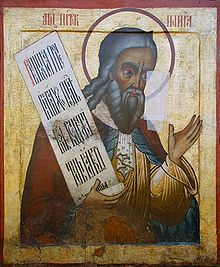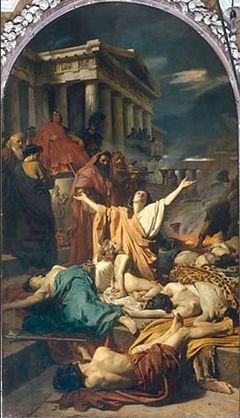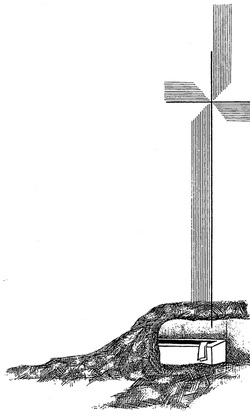 One way to pray is to make the Scriptures our own by putting them in the first person so that we see how they apply to us. Today let us do that with Psalm 91, the great Psalm of God's protection. God, you are my refuge, my fortress, my God in whom I trust. You will save me from the fowler’s snare and from the deadly pestilence. You will cover me with your feathers and under your wings I will find refuge. Your faithfulness will be my shield and rampart. I will not fear the terror of night, nor the arrow that flies by day, nor the pestilence that stalks in the darkness, nor the plague that destroys at midday. Although a thousand may fall at my side, ten thousand at my right hand, it will not come near me. I will only observe with my eyes and see the punishment of the wicked. I make the Most High my dwelling – the Lord, who is my refuge – and no harm will befall me, no disaster will come near my tent. He will command his angels concerning me to guard me in all my ways. They will lift me up in their hands so that I do not strike my foot against a stone. I will tread upon the lion and the cobra; I will trample the great lion and the serpent. Because I love the Lord He will rescue me. He will protect me because I acknowledge his name. I will call upon him and he will answer me. He will be with me in trouble. He will deliver me and honor me. He will give me long life and salvation.
0 Comments
 With regard to the prophets, such as Elijah whom we've been reading about, I'm not sure how far in advance God spoke to them about what he wanted them to do. For example, we don't see, "God said to him, 'Next month I want you to go to the desert.'" It always appears to be immediate instructions that are given. Sometimes there are long periods when the prophet is not speaking for God. Elijah waited during the 3 years of the drought before God told him to go back and speak to King Ahab again. What did he do during those 3 years? We could assume he did whatever type of work he was doing before God called him to speak to Ahab. Although he fled his home and went to Zarephath, perhaps he had a skill or trade that could be practiced anywhere. But even if he was able to practice his trade in Zarephath, he had left his home and his family behind. Nor do we know how old he was. Was he about the same age as Ahab? Older? Younger? What we do know about Elijah is that he had a relationship with God; he listened to God; he waited on God; he was devoted to God. When God spoke, Elijah listened. For Reflection: Where am I? Do I have a relationship with God? Do I listen to God? Do I wait on God? Am I devoted to God? If God called me to drop everything and do something for him, would I do it? Let us pray. God, I tell people you are the most important person in my life, but I see now that may true. I'm not sure that I could drop everything to follow your instructions. How do I build my trust in you to the point where I could do that?  Three years pass for Elijah in Zarephath. While Elijah was hiding out in the home of the widow, King Ahab mounted a search to find this prophet who had cursed him with drought. In all the surrounding nations no one knew where he was. Meanwhile the drought continued and the famine worsened. Queen Jezebel's response was to kill all the prophets of God that she could find. King Ahab and his top adviser (and faithful servant of God) Obadiah were trying to save the country from disaster. They went out one day looking for any remaining grassland on which to pasture the animals. Ahab and Obadiah had gone in different directions when Elijah walked up to Obadiah, who recognized him, and said, "Tell the King that Elijah is here" (1 Kings 18:1-8). For Reflection: Sometimes the plans of God don't work quickly. While God waited three years for Ahab, King of Israel, to repent, Elijah cooled his heals in modern-day Lebanon. This time of resistance to God was not a fun time for anyone. Ahab and Obadiah had to deal with the drought; Elijah had to leave his country; most of the prophets of God were killed. Where I am today? Am I in the "waiting on God to work out his plans" stage? Or am I in the action stage of speaking to people who need to hear God's word? Is it possible to be in both stages at once? Let us pray. Only you know, Lord, only you know the times of my life, the ups and the downs. Don't let my heart be stubborn like that of Ahab or Jezebel. Help me to stay true to you like Elijah and Obadiah in times of waiting and times of action.  Elijah is one of God's great prophets in the Old Testament. Elijah stood up to wicked King Ahab of Israel and his wife Jezebel and spoke God's truth to them. Ahab, largely due to the influence of Jezebel, had rejected worship of the one, true God and had begun not only to worship Baal but also built a temple for Baal. He erected a totem pole for Asherah. Baal and Asherah were nature gods or fertility gods. So when Elijah steps up and declares to Ahab that there will be no rain in the next few years except at Elijah's word (1 Kings 17:1), he is directly challenging the nature/fertility gods of Ahab. The gauntlet has been thrown down and God guides Elijah in finding food and water while hiding from the wrath of Ahab. God first leads Elijah to the Kerith Ravine where he is brought bread and meat twice a day by ravens and he drinks from the brook in the ravine as long as it continues to flow. For Reflection: It is no small matter to challenge a king and a false god. But God inspired, enabled, and empowered Elijah to do what was needed. And he backed up Elijah's word. Ahab probably didn't believe Elijah in the beginning. But when the drought and famine became severe Ahab realized that Elijah had spoken the truth. Am I more like Elijah or Ahab? Let us pray. Jesus, I want to be more like Elijah than Ahab. I want to stay close to you no matter what the people around me are doing.  Many may be unfamiliar with the story of a Jewish woman who was forced to watch her seven sons be killed in the space of a single day. The story is told in 2 Maccabees 7 that the king was trying to force the family to eat pork. The account is extremely gruesome. But the mother is lauded for combining "womanly emotion with manly courage" while she spoke words of encouragement to each of her sons. She reminded them that it was God who created the universe and gave them life, that God was merciful and would reward them with eternal life. She encouraged them to their death. Lastly the mother died. For Reflection: For all the mothers who send their sons (and daughters) off to war. For all the mothers who offer encouragement in times of persecution. For all the mothers who receive back the wounded and the dead, let us thank God. Let us Pray. We do not know your ways, Lord, nor understand why some suffer so much for believing in God the Creator. But we thank you for the mothers who give life and encouragement to their families to keep to the laws of God. We entrust these mothers in their love and their sorrow to your care. Our weapon against Satan is words, so what we have is a war of words. Some might not consider words to be very powerful. But we are not speaking of words of diplomacy. These are not the words of Secretary of State. We are speaking words with the same power as God's words of creation. When we speak, all of creation listens.
God's word did not go forth at the time of creation without effecting what he set forth to do. His word does not go forth void now (Isaiah 55:11). No, the word of God is living, active and sharp. It judges the thoughts and attitudes of the heart and applies to all of creation (Hebrews 4:12). Since we are praying again today on behalf of the persecuted Christians around the world, how then ought we to pray? We need to pray aloud and our words might be something like the following. As always, please feel free to add your own prayers. We command all man-made weapons to be silenced and broken and to never work again (Isaiah 54:17). We send the word of God into the hearts and minds of those who have a murdering spirit: you shall not kill (Exodus 20:13). We proclaim the word of God to all who worship false gods: you shall worship the Lord, the God who brought the Hebrew people out of the land of Egypt (Exodus 20;2-3). We command those with a spirit of hatred and covetousness: you shall not rape women, nor evict people from their homes (Exodus 20:14-17). We proclaim the word of God for all to hear: The Lord our God, the Lord is one. Love the Lord your God with all your heart and with all your soul and with all your strength (Deuteronomy 6:4-5; Mark 12:29). You shall love your neighbor as yourself (Mark 12:13).  "I brought you into this world and I can take you out," we sometimes hear as a threat from a father to a wayward son. I think there is an application for that thought in the spiritual world. As we continue to pray for persecuted Christians around the world, I have still been reflecting on the fact that the Christian enemy is not flesh and blood but the powers and spirits of darkness in this realm and in the heavenly places (Ephesians 6:12). And our weapon against these spiritual forces is the word (the sword of the Spirit, the word of God). God created everything in this world and in the spiritual realm by his word. His words, "let there be . . . ", took effect and accomplished what they were sent to do, including the creation of the angels. So the spiritual powers of darkness (fallen angels) were created by God - not for evil, of course, but for good. After creation, God continued to speak words to his people, but they didn't listen all that well. So he sent The Word, his Son. The Son spoke his words, but the people didn't listen all that well, until the Son shed his blood and said, "It is finished." Those who did listen wrote down the word of God which we have with us today. And this written word, which came from the flesh-and-blood Word, to the people created by the spoken word, we learn so that we can overcome the spiritual forces in the world and in the heavenly places by the blood of the lamb and by the word of our testimony (Revelation 12:11). The lamb's work is done (it is finished!) and our work is to speak the word of our testimony. The word of our testimony is the Word of God (Jesus), the word of God (Scripture) and the words that tell what God has done for us personally. What was created by a word of God we have been empowered to overcome (or take out) by a word from us. In our war on the spirits and powers of darkness, our weapon is the word. The evil spirits don't have the Word on their side, we do. Let us speak to the evil spirits, the powers of darkness, and overcome them with the blood of the Lamb and the word of our testimony. Let us declare. Spirits of war, hatred, murder, genocide, you were defeated by the blood of the Lamb. That same blood was shed for me so that I might be washed clean and set free from my sins. Furthermore, Jesus is my Lord. He has given me abundant life. He has justified me and made me righteous in his sight. By God's Word and by my word you are cast down. You have no more power in this world. You are defeated. The captives are set free.  Sit, walk, build, imitate, love, submit. What is next in Paul's exhortation to the church in Ephesus? Stand. Yet we cannot move into the standing position if we do not progress through the earlier ones. And whereas walking comes out of sitting in the heavenly realms with Christ, so does standing. Sitting is our place of rest and nourishment. Sitting is our grounding. We must be grounded and rooted in Christ and what he has done for us before we endeavor to do anything with him. We cannot do anything for Christ, but we can do many things with him who strengthens us and enables us to fulfill our calling, our destiny to help establish the kingdom of God on earth. It is sitting and then walking, imitating, loving and submitting that enable us to be "strong in the Lord" and to "put on the full armor of God" (Ephesians 6:10-11) so that we can stand. We construct our own set of armor while sitting and walking. We each have our own belt of truth, breastplate of righteousness, shoes of the gospel of peace, shield of faith, helmet of salvation and sword of the Spirit, the Word of God. Our belt of truth may be stronger than someone else's, but their shield of faith may be stronger than ours. Together we are one body of Christ equipped with the strongest armor to stand against the enemy. It is important not to stand alone, but to stand as one with the body of Christ. For Reflection: Am I sitting with Christ? Am I walking with him? Am I standing with Christ and with his body, or am I standing alone? Let us pray. God, you are my refuge and strength. I sit with you, I walk with you, I stand with you.  Sit, walk, build, put off, put on. What's next? In our brief review of Paul's letter to the Ephesian church, we have come across these command verbs. We are to sit with Christ in the heavenly places. This is a time of resting in Him and learning who He is and who we are. When we have done this, we are to walk in the ways Christ has shown us. We are to build one another up into the mature body of Christ. Then put off our old ways, and put on the new ways of Christ. So what is next? Imitate God. Paul writes, "Be imitators of God, therefore, as dearly loved children and live a life of love, just as Christ loved us and gave himself up for us as a fragrant offering and sacrifice to God" (Ephesians 5:1-2). We learn that we are dearly loved children when we sit in the place of rest with him and learn his ways. When we sit with him in the heavenly places, we observe the ways of the kingdom of God. Since Jesus and the Father are one, when we learn the ways of Jesus, we learn the ways of the Father (and the Holy Spirit). That is how we learn what is to be imitated. Children learn by imitating their parents. Even Paul did not begin his apostolic life by going out right away to do things. He began by learning about Jesus and learning new ways of living and loving. He began from that place of rest in Christ before he began to preach. Although he began with "the big reveal", he had to learn to walk all over again. He had to learn to build rather than tear down. He had to put off his old ways before he could put on the new. He had to learn to imitate God when he himself had not seen Jesus in his earthly life. For Reflection: There are many ways to learn to imitate God: reading and studying the Scriptures, prayer, meditation, walking with others who are more mature than we are. And, if we belong to a sacramental church, availing ourselves of the sacraments. Let us pray. Jesus, we know that you do not leave us adrift when it comes to learning how to follow you. Help us, your beloved children, to grow more like you every day. What do you want me to grow in today? |
AliceI started this website and blog on May 1, 2012. I am a Catholic who has been in ministry for many years. I first developed what I would call a close relationship with Jesus in the early 1970s. Ever since then I have been praying with people for healing and other needs. It is because I have seen so many of these prayers answered that I am so bold as to offer to pray for you individually through this website and phone line. Archives
July 2021
Categories
All
|
Proudly powered by Weebly


 RSS Feed
RSS Feed